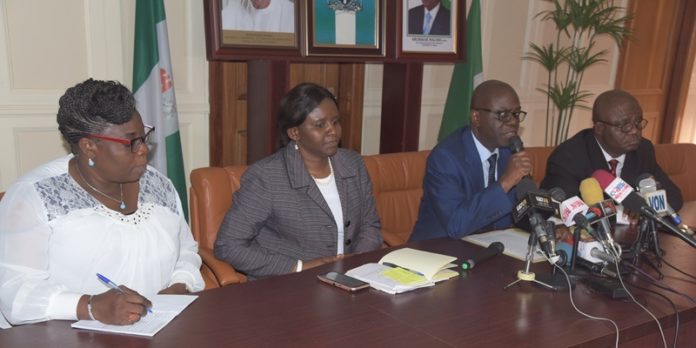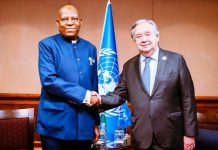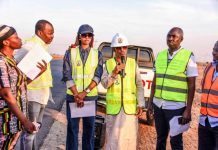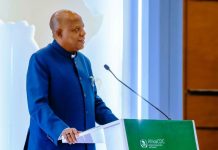Nigeria will serve alongside with France, Argentina and Romania in the executive decision-making body of the OGP Global Steering Committee for the next three years starting from October, 2018.
The Honorable Attorney General of the Federation and Minister of Justice, Abubakar Malami, SAN made this known at the Media Briefing held on Tuesday April 10, 2018 at the Ministry in Abuja.
Represented by the Solicitor General of the Federation/Permanent Secretary, Dayo Apata, Esq explained that Nigeria, on 21st March, 2018, was elected into the Global Steering Committee of the Open Government Partnership (OGP) which is the executive decision-making body.
According to him,” the main role of Global OGP Steering Committee is to develop, promote and safeguard the values, principles and interest of OGP. The Steering Committee establishes the core ideas, principles and rules of partnership and oversees its functioning”. “It is comprised of governments and civil society representatives that together guide the ongoing development and direction of OGP, maintaining high standards for the initiative and ensuring sustainability”, he added.
The Minister disclosed that since 2011, the OGP had grown rapidly from eight (8) countries to seventy-five national twenty local governments alongside thousands of civil society organizations. He added that Nigeria joined the OGP in July 2016 to further the reforms already initiated by President Muhammadu Buhari to fight corruption and block leakages of resources which could have been used to fund development.
In collaboration with non-state actors and civil society organizations, a National Action Plan (NAP) was created which covered four thematic areas ; fiscal transparency, anti-corruption, access to information and citizen engagement.
He emphasized that, “the commitments are spread across fourteen issues such as open budget, open contracting, revenue transparency, extractive industry transparency, ease of doing business, asset management transparency, and citizen participant in governance”.
Highlighting the significant efforts so far made by the government in asset recovery, Malami said, “ a recent Memorandum of Understanding (MOU) on the co-monitoring of the expenditure of Abacha loot repatriated from Switzerland has been described by stakeholders as model for other countries on how best to transparently utilize looted when they are returned to their countries of origin. This is in line with our deliberate policy to have clear and transparent guidelines for managing all recovered assets in line with anti-corruption commitments in the National Action Plan (NAP)”.
He revealed that there is an ongoing effort to establish a public register of beneficial owners of which the Corporate Affairs Commission (CAC) is working closely with the government of United Kingdom and Open Ownership to develop open data standards to achieve the goal. He disclosed that a new legislation that would ensure that data is available to the public is already in the parliament and should become enforceable at the end of 2018.
In the area of open budgeting, Malami said that there have been consistent efforts to mainstream the input of Civil Society groups to make the budgeting process more inclusive and feedback oriented with the publication of Citizens Guide on budget and deployment of a project implementation monitoring app – the “Monitor” by the Budget Office.
He said that working with Civil Society Organizations, government contract procedures would be fully automated as the National Open Contracting Platform developed by the Bureau for Public Procurement (BPP) becomes fully operational in next few weeks.
In view of this, Malami said BPP is already implementing a pilot phase with a few selected ministries and agencies. This involves the training of seven hundred (700) Chief Executive Officers on the implementation of open contracting principles by the Office of the Secretary to the Government of the Federation and the BPP on 7TH April, 2018, which signals a new frontier in procurement process in Nigeria.
Earlier in the year, it was announced that four seats in the Global Steering Committee became vacant as at last year with Indonesia rotating after serving two consecutive terms and Chile, France and Romania finishing their terms. A call for candidacy was issued by the OGP support unit from January 26th to March 12th 2018. Four countries were endorsed as a replacement including Nigeria representing African Region, with France and Romania running a second consecutive time.
Ogundoro Modupe
Deputy Director






